The US is winning at building relationships with China's neighbours
Academic Zhu Ying notes that the war in Ukraine has brought the US, Japan and South Korea closer together on issues such as Taiwan and the nuclear threat from North Korea, thus strengthening the US's strategy of working with alliances. In exchange for the US's support in forms such as a nuclear umbrella, Japan and South Korea will align with the US in its competition with China.
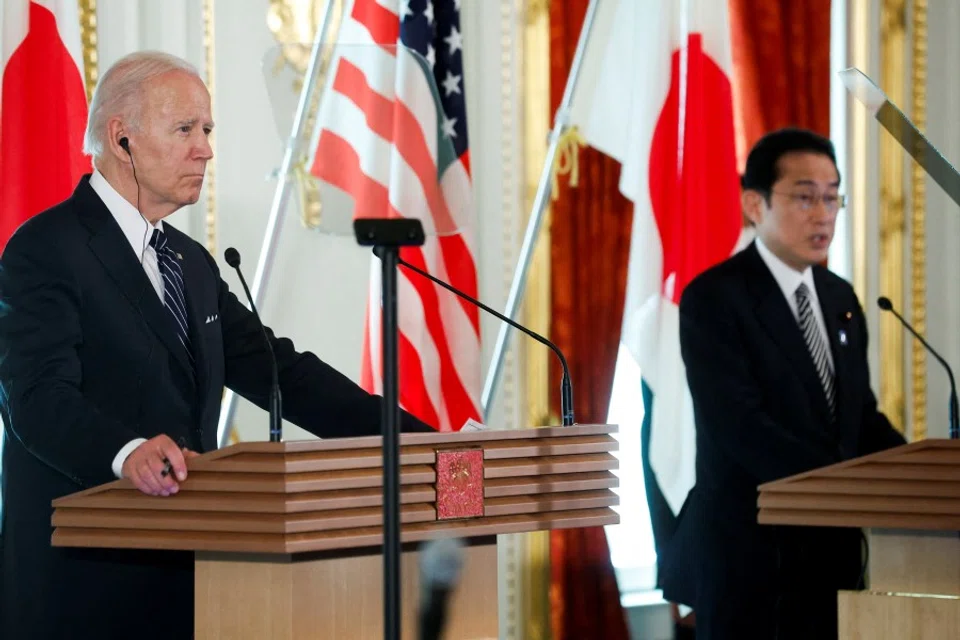
Although US President Joe Biden went on his recent trip to Asia with China on his mind, he visited South Korea and Japan but not China. Not only that, Biden created a triangular alliance between the US, Japan and South Korea against China right on China's doorstep. He was aided in this endeavour by Putin's war in Ukraine and recent interactions between China, Japan and South Korea, as well as China's bilateral relations with India and Australia.
Relations with China could sour in an instant
The US-Japan-South Korea trilateral alliance is definitely not just about the relationship between the US, Japan and South Korea. It exists alongside the China-Japan-South Korea relationship. The two triangles involve six sets of bilateral relations - China-Japan, China-US, China-South Korea, US-Japan, US-South Korea and Japan-South Korea - with two variables thrown in: the North Korean nuclear threat and the Taiwan issue.
While China is the biggest trading partner of both Japan and South Korea, bilateral relations could turn frosty in an instant.
The six bilateral relationships and their relation to the two variables determine the strength of the two triangles. And of course, everything revolves around China-US relations, with the hard and soft powers of these two nations the deciding factors that would ultimately affect the different relationships.
First, the China-Japan-South Korea trilateral relationship is confined to the fragile economic and trade sector, and relations on that front have long been stagnant. A free trade zone among the three countries has been mooted for 20 years but has yet to see the light of day. While China is the biggest trading partner of both Japan and South Korea, bilateral relations could turn frosty in an instant.
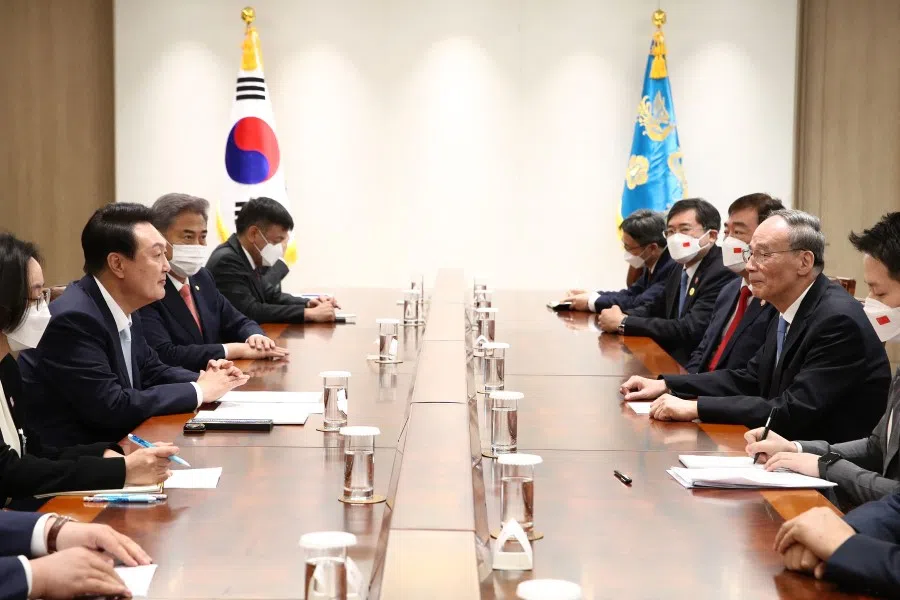
In 2015, then South Korean President Park Geun-hye observed a military parade from atop Tiananmen in Beijing, the only head of state of a major US ally to attend the event. But as the Chinese leaders did not respond to Park's requests for help after North Korea's repeated missile launches, she turned to the US and Japan. The THAAD (South Korea's Terminal High Altitude Area Defence anti-missile battery, which became operational in 2017) deployment controversy that followed brought China-South Korea relations to a freezing point.
South Korean retail giant Lotte Group, which was remotely connected to the THAAD system, was forced to leave China, while The Korea Times ran an article saying that the South Korean government was discouraged by Beijing's actions.
In the case of Japan, public sentiments have not been encouraging in both China and Japan for quite some time. In 2010, China restricted exports of rare earths to Japan, after an incident in which a Chinese fishing boat collided with a Japan Coast Guard patrol ship near the Diaoyu/Senkaku islands. The ban resulted in the European Union and the US filing a complaint with the World Trade Organization - a case that China lost in 2014.
Anti-Japanese sentiments in China got especially violent in 2012 when droves of Chinese smashed Japanese stores, damaged China-produced Japanese-model vehicles, and even beat up their Chinese drivers. In the meantime, anti-Japanese series became a hit on Chinese TV stations. A Japanese man published an encyclopedia of anti-Japanese hit series in 2018 that listed 21 such dramas from China, describing them as "amazing anti-Japanese patriotic comedies".
The war is a clear message to Japan and South Korea that for a small country that has been denuclearised, the promise of nuclear security from various countries including China, the US and Russia is meaningless.
Cementing the US-Japan-South Korea relationship
At present, the war in Ukraine has cemented the relationship among the US, Japan and South Korea. It has touched a raw nerve for Japan and South Korea in terms of nuclear weapons. The war is a clear message to Japan and South Korea that for a small country that has been denuclearised, the promise of nuclear security from various countries including China, the US and Russia is meaningless. A bloodthirsty politician can destroy everything in a country in an instant at will.
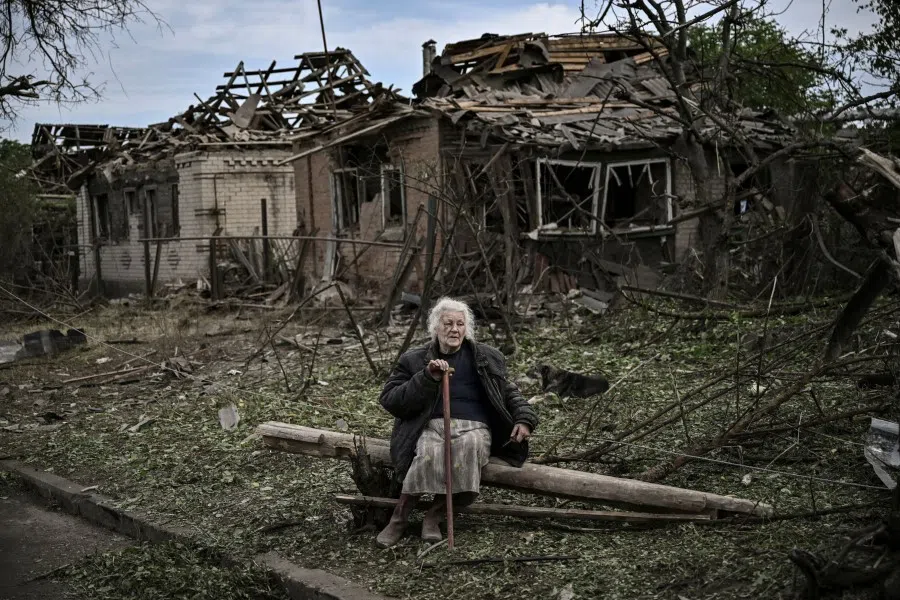
For Japan and South Korea, the war in Ukraine immediately brought to mind the Kim family regime. Would Pyongyang fire a nuclear missile? Japan would also be worried about whether mainland China would reunify with Taiwan by force.
In such times, who would Japan and South Korea turn to, if not the US? Besides, it is not that Japan and South Korea do not have the capability to develop nuclear weapons.
Finding security amid North Korea's nuclear threat
In August 1970, South Korea began secretly developing nuclear weapons. In 1972, South Korea signed agreements with French and Canadian nuclear energy companies for nuclear fuel reprocessing equipment. It also brought back 20 scientists of Korean descent from around the world to build up the necessary capabilities.
It was not until May 1974, after India conducted its first nuclear test, that the US started to be wary of South Korea's nuclear activities. The US forced South Korea to abandon its nuclear weapons development plan, to avoid provoking North Korea and Japan into developing nuclear weapons that could lead to unpredictable consequences.
Japan's arsenal of nuclear materials was enough to build 1,000 nuclear warheads, but it had proactively dropped the idea of developing nuclear weapons after the Second World War.
Nonetheless, the war in Ukraine has made Japan restless. Former Japanese Prime Minister Shinzo Abe questioned the taboo topic of nuclear sharing, which echoes NATO's nuclear deterrence concept whereby multiple countries share nuclear capabilities. He stressed that with Russia's invasion of Ukraine, "we should not regard a discussion on how the world's security is maintained as taboo".
Naturally, the war in Ukraine has prompted Japan to develop its armaments, which could derail Japan from the path of pacifism that it has followed since the end of the Second World War.
There are growing calls from Japan's Diet members to substantially increase the defence budget, with increasingly intense debate over whether to purchase weapons capable of hitting enemy missile bases.
If the US does not speak up now, the stability of the East Asia region might change in an instant. Besides, Japan is highly sensitive to the Taiwan issue, even as it faces a nuclear power.
The more obsessed Kim is with nuclear weapons, the more wary and focused on self-preservation Japan and South Korea will be. Earning money is no longer a top priority.
Life is more important than money
Putin has indeed bonded the US, Japan and South Korea together. If it were not for the war in Ukraine, Japan and South Korea would have continued to cling to the economy and trade, while being at the mercy of China's whims.
At this time, newly elected South Korean President Yoon Suk-yeol faces a long-failed policy of appeasement with the Kim regime in North Korea. The war in Ukraine has swept away the years of historical problems between Japan and South Korea. It has reinforced Kim Jung-un's belief that having three generations of the Kim family developing nuclear weapons is the key to holding on to political power. On 30 April, Kim threatened the "pre-emptive" use of nuclear weapons.
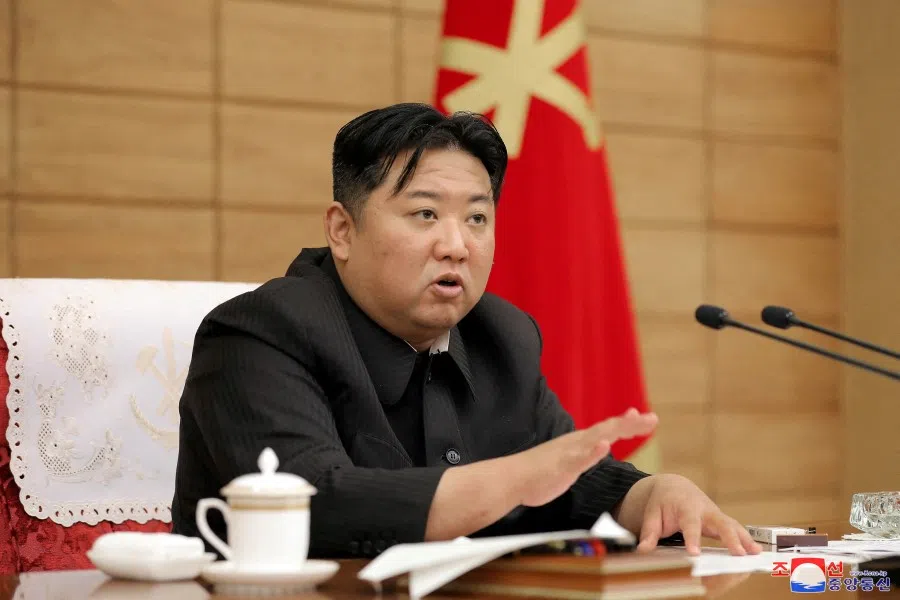
The more obsessed Kim is with nuclear weapons, the more wary and focused on self-preservation Japan and South Korea will be. Earning money is no longer a top priority.
Guided by the flow of events, Biden easily regrouped both the existing US-Japan and US-South Korea alliances that quickly overshadowed the China-Japan-South Korea trilateral relationship. Security takes precedence over the economy, just as life takes precedence over money - even the economy is subject to supply chain security issues.
As Japan and South Korea align with the US, there will be both security and money. For Biden, after 16 months, the opportunity to deal with China through alliances has finally presented itself. The US-Japan-South Korea trilateral alliance has become an important part of the US's global alliance strategy and the foundation of its Indo-Pacific strategy.
Michael J Green, former senior director for Asian Affairs with the White House National Security Council, told Associated Press that for the first time, the US's allies in Europe and Asia realise that they are all facing a risk, and it is the first time in the post-war era that they are truly in step.
Neil Thomas, regional analyst with political risk advisory Eurasia Group, said, "Biden will receive a warm welcome in the region, as China's assertive foreign policy has pushed many countries to balance against Beijing by pursuing closer ties with Washington."
Alignment with the US
Finally, the US, Japan and South Korea reached a consensus on two key issues.
The world's 'biggest geopolitical test'
According to the Interim National Security Strategic Guidance released by the Biden administration in March 2021, China "is the only competitor potentially capable of combining its economic, diplomatic, military, and technological power to mount a sustained challenge to a stable and open international system". US Secretary of State Antony Blinken also said that the relationship between the US and China is the world's "biggest geopolitical test" of the 21st century.
For South Korea, its biggest external problem is the threat from North Korea, while the international order mentioned in the joint statement applies to North Korea and East Asia.
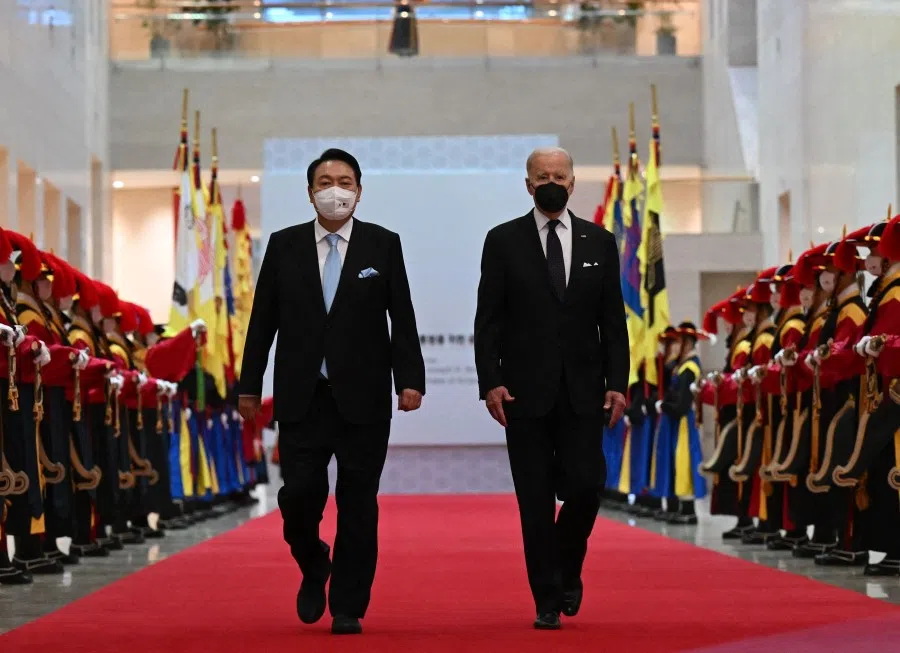
Indeed, Biden's visit to Asia was all on China's account. He stressed, "America's alliances are our greatest asset." In the joint press conference with Yoon, Biden spoke of "competition between democracies and autocracies", with Asia Pacific being a key battlefield.
In response, the US-South Korea joint statement said, "Both leaders underscore the importance of ROK-US-Japan trilateral cooperation for responding to the DPRK's challenges, protecting shared security and prosperity, upholding common values, and bolstering the rules-based international order."
For South Korea, its biggest external problem is the threat from North Korea, while the international order mentioned in the joint statement applies to North Korea and East Asia.
Japan and the US reaffirm commitment to Taiwan
Second, at the joint press conference between the US and Japan, Japanese Prime Minister Fumio Kishida said, "For China, we concurred to monitor closely recent activities of Chinese navy and joint military exercise of China and Russia, and strongly oppose the attempt to change the status quo by force."
This was a reiteration of Kishida's comment on 3 March, stating, "We cannot under any circumstances accept unilateral changes to the status quo by force."
Furthermore, Biden has recently said that the US will defend Taiwan through military intervention, which was definitely not a gaffe. In October 2021, Biden also talked about defending Taiwan, explaining that the US has a "rock-solid commitment" to Taiwan that spans administrations, and will continue to maintain peace and stability in the Taiwan Strait and the region.
Biden's comments are a step further from the US policy of not supporting independence for Taiwan. The New York Times reported that Biden hinted at the press conference that he would go further to help Taiwan than Ukraine. But what is "further"? What is lacking in US assistance to Ukraine?
Even if Biden misspoke, we can be sure that the US opposes changing the status quo in the Taiwan Strait by force. Polls show a growing number of the US public support US troops assisting Taiwan.
The US provides Japan with a nuclear umbrella, while Japan supports the US policy on Taiwan.
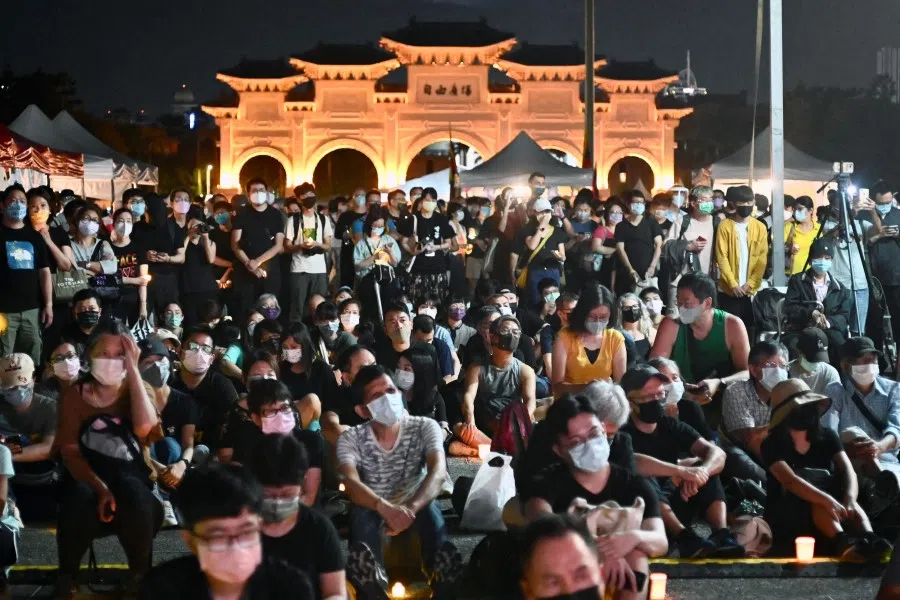
On 11 May, Kurt Campbell, National Security Council coordinator for the Indo-Pacific, said that Asian countries were shocked and worried at the statement released by China and Russia before the Olympics, and are resolved to take it as a warning not to let the military action in Europe happen in the Indo-Pacific region.
Campbell's comments are consistent in principle with Kishida's comments - without US support, the Japanese prime minister would not dare to make such statements.
Taiwan is the external issue that Japan is most concerned about, far beyond its concern about the nuclear threat from North Korea. Japan's stand on Taiwan is getting increasingly tough, and this is directly linked to the deteriorating China-US relations. The US provides Japan with a nuclear umbrella, while Japan supports the US policy on Taiwan.
The China-Japan-South Korea trilateral relationship will be no match for the US-Japan-South Korea relationship.
The win-win situation
The US provides security to Japan and South Korea on the external issues they are most concerned about, while Japan and South Korea stand with the US and support it in competing with China.
The joint statements of the US with Japan and South Korea mention China by name; in particular, the US-Japan statement criticised China in various areas, which is rare. The China-Japan-South Korea trilateral relationship will be no match for the US-Japan-South Korea relationship.
Related: Biden's Asia tour: US deepening its commitments to counter China | Can South Korea's Yoon and China's Xi denuclearise North Korea? | To lead the world, Biden's US will need China's help with North Korea | South Korea's new president needs to avoid predecessor's mistakes and reframe foreign policy priorities | Will South Korea's new president take an anti-China stance? | Japanese academic: Will Northeast Asia work with Biden on North Korea? | Biden's 'gaffe' on Taiwan reflects changing status quo in the Taiwan Strait


![[Big read] When the Arctic opens, what happens to Singapore?](https://cassette.sphdigital.com.sg/image/thinkchina/da65edebca34645c711c55e83e9877109b3c53847ebb1305573974651df1d13a)


